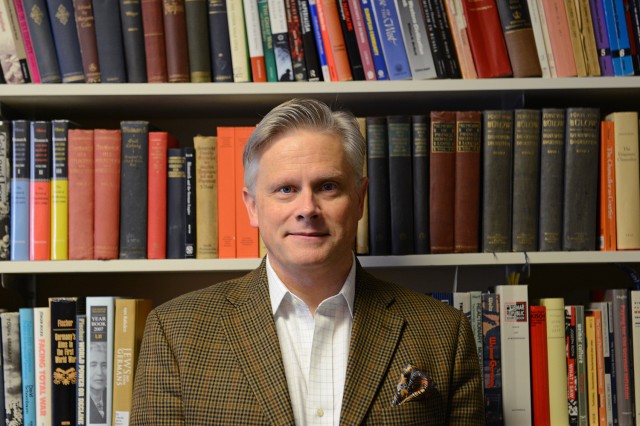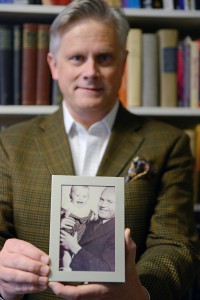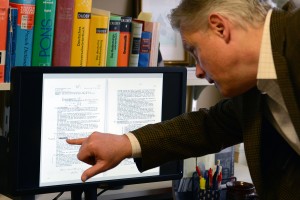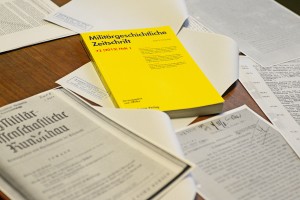Grimmer-Solem’s Research Sheds New Light on Celebrated German General


Grimmer-Solem’s grandfather, Dr. Odd Solem, was arrested by the Gestapo along with two other Norwegians during the German occupation of Norway in the summer of 1940. He was sentenced to death by a German military tribunal, but had his sentence reduced to a prison term in Germersheim. There, he met and befriended General Hans von Sponeck, a German general who was court-martialed and imprisoned for refusing to follow Hitler’s orders during a major Soviet counteroffensive on the Crimean Peninsula in 1941 by withdrawing his troops from Kerch, likely saving the lives of thousands of soldiers. Von Sponeck was ultimately executed on the orders of Heinrich Himmler following the failed assassination attempt on Hitler in July 1944, while Solem and the other prisoners narrowly escaped an SS execution squad and survived the war.
In the decades since the war, von Sponeck has been celebrated in Germany for his moral courage, with an Air Force base, city streets and other monuments named after him. Along with the tales of von Sponeck’s kindness toward Grimmer-Solem’s grandfather, the general’s unusual reputation as a heroic “anti-Nazi” sparked Grimmer-Solem’s interest. Since he regularly teaches a course on Nazi Germany and knows the literature on the role of the Wehrmacht (Germany’s unified armed forces from 1935-45) in war crimes in the Soviet Union, he began to have questions about von Sponeck’s career when it became clear that the general had commanded units of the German 11th Army during Operation Barbarossa, the invasion of the Soviet Union, in the summer and fall of 1941. War crimes and crimes against humanity are well documented within the area of operation of the 11th Army. Grimmer-Solem undertook a detailed investigation of von Sponeck’s military career in the German Military Archives in March 2013 and discovered evidence that the general’s record was far from spotless: The records showed close cooperation between the military unit von Sponeck commanded and the SS in committing numerous war crimes and crimes against humanity in the southern Ukraine and Crimea in 1941.

Two days before the invasion of the Soviet Union in June 1941, General von Sponeck ordered that any Jews among Red Army prisoners of war should be identified and specially segregated. Once the invasion was underway, his general staff warned soldiers to view all Jewish civilians as potential spies and to take harsh measures against suspected saboteurs, including women and children, thus enabling the Nazi regime’s war of destruction against “Jewish-Bolshevism.” In early October 1941, von Sponeck personally ordered that his soldiers work closely with SS mobile killing units by identifying suspicious civilians and handing them over to the SS. In the towns Henichesk and Melitopol in eastern Ukraine, von Sponeck’s units cooperated with the SS in the indiscriminate murder of over 2,000 Jewish men women and children. Similar massacres are also documented during von Sponeck’s command of other Wehrmacht units in Crimea in December 1941, notably in Feodosia. One particularly notorious order given by von Sponeck that month treated all Jews as partisans and ordered any Red Army soldiers, even those in uniform, to be shot on sight. By that point the 11th Army had accelerated the destruction of Crimea’s Jews as part of an anti-partisan struggle. The army thus participated actively in the Holocaust by identifying, marking and guarding Jews as well as by offering vehicles, weapons, and soldiers who provided security and participated with the SS in the subsequent mass shootings.
“The broader implications of these findings are profound because they reveal the participation of many tens of thousands of ordinary Wehrmacht soldiers in the mass murder of Jews,” said Grimmer-Solem. “The fact that von Sponeck’s involvement in these crimes was not investigated and made public before now also raises troubling questions about whether the German public has come to terms fully with the culpability of the Wehrmacht in the Holocaust.”

Grimmer-Solem’s article, published in December 2013 in the prestigious military history journal, Militärgeschichtliche Zeitschrift, is believed to be the first scholarly article dealing specifically with von Sponeck’s involvement in war crimes. This journal is edited by a branch of the German Armed Forces (Bundeswehr) and has since ignited a debate about von Sponeck’s celebrated spot in public life. In February, Chancellor Angela Merkel’s government responded to questions submitted in the Bundestag (the national parliament) by a caucus of the party Die Linke. These questions made many references to Grimmer-Solem’s research. Merkel’s government affirmed Grimmer-Solem’s scholarship, noting that his research showed that von Sponeck shares guilt for crimes committed by the Nazis in Operation Barbarossa. It also reaffirmed that the German Federal Armed Forces reject all associations with suspected war criminals of the former Wehrmacht. Consequently, the government has initiated a dialogue within the Armed Forces to consider renaming the Luftwaffe base in Germersheim. According to German Armed Forces guidelines, however, any petition to rename military installations must be initiated by the members of the affected base and the local community.
The government was also forced to respond to questions about an internal investigation by the German military into von Sponeck’s army career in 2004, which was requested by the then-Battalion Commander at the Luftwaffe base at Germersheim in preparation for the 60th anniversary commemoration of von Sponeck’s death. The investigation, which was first made public by the German newsmagazine Der Spiegel in December 2013 following the publication of Grimmer-Solem’s article, argued that von Sponeck was involved in war crimes, and it recommended that the government consider renaming the base. Yet this report was never forwarded up the military chain of command, and no further action was taken at the time.
Since the government’s response, the Bundestag deputy for the southern Palatinate, Thomas Hitschler (SPD), who serves as a member of the Bundestag’s Defense Committee, has been active in fostering a dialogue about renaming the Luftwaffe base. Germersheim Mayor Marcus Schaile mentioned in recent news reports that the city was surprised by the revelations about von Sponeck, but he affirmed that the task now at hand was to accelerate the dialogue about a new name for the base. On Feb. 28 Schaile informed the city council that a special meeting of the council would be held with the participation of the local Luftwaffe commander. They will consult with a Federal Armed Forces historian and citizens of the city to determine an appropriate new name for the base. Once this has been done, the mayor said that they will have to make decisions about the monument to von Sponeck in the city park Fronte Lamotte, as well as the street in Germersheim that bears his name. Besides Germersheim, there are streets and monuments honoring General von Sponeck in both Bremen and Neustrelitz.
“The case of General von Sponeck is complicated. He had the moral courage to refuse an order from Hitler to stand his ground when his troops were threatened with destruction, and he was court-martialed and later killed by the Nazis for it. At the same time, he did not refuse to carry out the criminal Commissar Order, which gave cover for what became a genocidal war against ‘Jewish Bolshevism’ in the Soviet Union,” said Grimmer-Solem. “While von Sponeck was not a Nazi in the technical sense and was himself even critical of some aspects of the regime, his orders and the actions of his troops leave no doubt that he had internalized anti-Semitic racism. Sponeck shows that it was not necessary to be an ideologically-driven Nazi to carry out the Nazi regime’s policy of mass murder. Under Nazism and in conditions of war, the lines between victim and perpetrator, between hero and follower could dissolve within a single person.”
Follow the latest news on Grimmer-Solem’s scholarship and its impact in Germany on his website.

